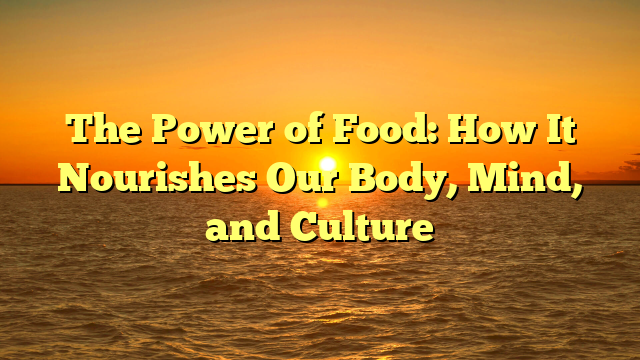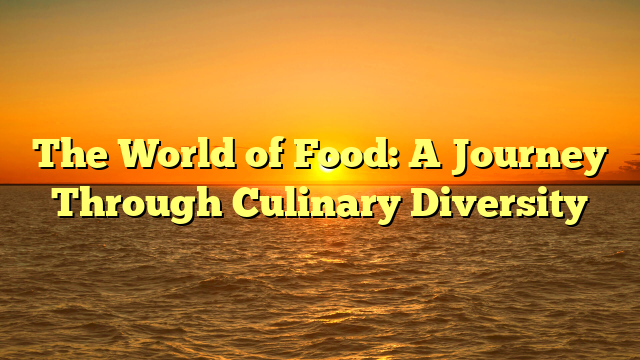
Food is much more than a necessity; it is a universal language that brings people together,
tells stories, and preserves traditions. Across cultures and centuries, food has evolved not
only as a means of survival but also as an art form. Whether you are indulging in a
five-course gourmet meal, savoring street food, or preparing a simple homemade dish, food
connects us to our history, heritage, and emotions. In this article, we will explore the
multifaceted world of food, touching on its flavors, cultural significance, and impact on health.
The Basics of Taste: Flavor and Texture
When it comes to food, flavor is king. The balance of sweet, sour, salty, bitter, and umami
(savory) is at the heart of every dish, and how these tastes interact can create a culinary
masterpiece or a bland meal. Sweetness, often associated with fruits and sugars, provides a
sense of comfort and pleasure. Salty foods, like cheese and cured meats, enhance other
flavors and create a craving for more. Sourness, from ingredients like lemons or vinegar, can
brighten a dish and add complexity. Bitterness, though less common in many Western
dishes, plays a crucial role in balancing the richness of other flavors in global cuisines,
particularly in Mediterranean and Asian cooking. Finally, umami, the savory taste of foods
like soy sauce, cheese, and meats, is key to creating depth and richness in meals.
In addition to taste, texture plays a vital role in how we experience food. The crunch of fresh
vegetables, the smoothness of a creamy soup, or the chewiness of a perfectly cooked steak
all contribute to the enjoyment of a meal. Chefs often combine various textures to create
contrast, making each bite a new sensory experience.
Cultural Significance: Food as a Reflection of Identity
Food is deeply tied to cultural identity. Each culture has developed its own distinct cuisine,
using local ingredients and techniques passed down through generations. These food
traditions are not only practical, as they often reflect the resources available in a particular
region, but also symbolic, representing the values, beliefs, and history of the people who
create them.
Take, for example, the iconic Italian pizza. While its modern form may be familiar around the
world, pizza has deep historical roots in Italy, with its origins tracing back to ancient
civilizations that used flatbreads as a base. Over centuries, Italians developed their own
unique variations of pizza, using local ingredients like tomatoes, mozzarella, and olive oil.
Today, pizza represents Italian ingenuity, simplicity, and the importance of family meals.
Similarly, sushi, a beloved dish from Japan, reflects not only a rich culinary tradition but also
the Japanese appreciation for seasonality and presentation. The precision involved in
creating sushi highlights Japan’s cultural emphasis on craftsmanship, respect for nature, and
the idea of “wabi-sabi,” or finding beauty in imperfection.
Food also plays an essential role in celebrations and rituals. In bayar 4d , certain dishes
are prepared for holidays, weddings, and other milestones. The act of preparing and sharing
these foods strengthens communal bonds, offering a sense of belonging and continuity. For
example, in the Jewish tradition, challah bread is often baked for Shabbat, symbolizing the
sanctity and joy of the weekly Sabbath. Similarly, Thanksgiving dinner in the United States is
a time when families come together to share a meal that represents gratitude and
togetherness.
Health and Nutrition: Eating for Well-being
While food brings people joy and unites cultures, its role in health and nutrition cannot be
overstated. The food we consume has a direct impact on our physical well-being, influencing
everything from our energy levels to our risk for chronic diseases. In today’s world, where
processed foods are ubiquitous and convenience often trumps nutritional value, making
informed choices about what we eat has never been more important.
At the most basic level, food provides us with the energy and nutrients our bodies need to
function. These nutrients include carbohydrates, proteins, fats, vitamins, and minerals, all of
which are essential for growth, repair, and optimal health. However, the quality of our food
choices is just as important as the quantity. Whole foods like fruits, vegetables, whole grains,
and lean proteins provide us with the necessary nutrients without the added sugars,
unhealthy fats, and excessive sodium found in many processed foods.
For instance, the Mediterranean diet, which emphasizes whole grains, healthy fats, lean
meats, and plenty of fruits and vegetables, has been associated with lower rates of heart
disease and improved overall longevity. This diet is not only nutrient-dense but also offers a
variety of flavors and textures, making it enjoyable as well as healthy.
In contrast, diets high in processed foods, refined sugars, and unhealthy fats have been
linked to a host of health issues, including obesity, diabetes, and cardiovascular disease. In
today’s fast-paced society, it’s easy to grab a quick meal or snack that offers little nutritional
value, but making the effort to prioritize whole, unprocessed foods can have a profound
impact on long-term health.
Sustainability: The Future of Food
As global populations continue to grow, the way we produce and consume food will play a
crucial role in the health of our planet. The environmental impact of food production,
particularly industrial farming practices, is significant, contributing to deforestation, loss of
biodiversity, and climate change. As a result, there has been a growing movement toward
sustainable eating practices.
Sustainable eating involves choosing foods that are produced in ways that are
environmentally friendly, economically viable, and socially responsible. This includes
supporting local farmers, reducing food waste, and incorporating plant-based foods into our
diets. Many people are also turning to alternative protein sources, such as legumes, nuts,
and even lab-grown meat, in order to reduce their carbon footprint.
The rise of plant-based diets, in particular, has brought attention to the environmental
benefits of eating less meat. Studies show that plant-based diets require fewer resources
like water and land and produce fewer greenhouse gases compared to meat-heavy diets.
Incorporating more plant-based foods into our meals can contribute to better health and a
more sustainable food system.
Conclusion
Food is much more than a physical sustenance; it is an essential part of who we are as
individuals and as societies. The flavors, textures, and traditions tied to food enrich our lives
and deepen our understanding of the world around us. From cultural significance to health
benefits and sustainability, food shapes our daily existence in profound ways. As we move
forward, it is important to continue to explore food not only as a means of nourishment but
also as a vehicle for connection, innovation, and positive change.





